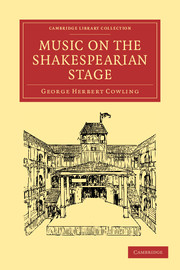Book contents
- Frontmatter
- PREFACE
- Contents
- LIST OF ILLUSTRATIONS
- Introduction
- CHAP. I Music in pre-Shakespearian drama
- CHAP. II An Elizabethan Stage and its music
- CHAP. III Musical instruments and their uses
- CHAP. IV Incidental music
- CHAP. V Musicians, Singers and Songs
- CHAP. VI Elizabethan music, and its share in the drama
- CHAP. VII Some literary allusions to music in Elizabethan plays
- Bibliography
- Appendix
- Index
CHAP. V - Musicians, Singers and Songs
Published online by Cambridge University Press: 07 September 2010
- Frontmatter
- PREFACE
- Contents
- LIST OF ILLUSTRATIONS
- Introduction
- CHAP. I Music in pre-Shakespearian drama
- CHAP. II An Elizabethan Stage and its music
- CHAP. III Musical instruments and their uses
- CHAP. IV Incidental music
- CHAP. V Musicians, Singers and Songs
- CHAP. VI Elizabethan music, and its share in the drama
- CHAP. VII Some literary allusions to music in Elizabethan plays
- Bibliography
- Appendix
- Index
Summary
The men who provided this music in the theatres were a despised and outlawed caste, recruited from the ranks of strolling musicians. They were despised by the church, hated by Puritans, and mocked at even by a writer of plays like Dekker. Without visible means of support, wandering from tavern to tavern and town to town, with many ready to listen and few willing to pay, forced to tout for a hearing and beg for a pittance, is it a marvel that they were called thriftless and impudent? “As familiar as a fiddler” seems to have been a proverbial saying, and Dekker confirms it in his Guls Horn-Booke (1609) in the chapter describing “How a Gallant should behave himself in a Taverne” (Chap. VII). “If you desire not to be haunted with Fidlers, who by the statute have as much libertie as Roagues to travell into any place, having the pasport of the house about them, bring then no women along with you.” It was this impudence and brazenness that drew on their heads the wrath of beneficed clergymen. “London is so full of unprofitable pipers and fidlers that a man can no sooner enter a tavern than two or three cast of them hang at his heels,” says Stephen Gosson in his Short Apologie (1587). John Earle tells the same story about a stage-trumpeter.
- Type
- Chapter
- Information
- Music on the Shakespearian Stage , pp. 74 - 88Publisher: Cambridge University PressPrint publication year: 2009First published in: 1913

